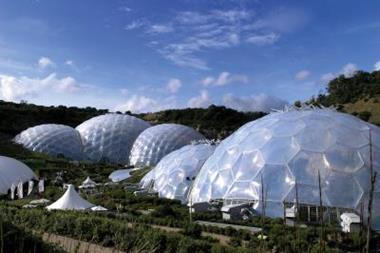Tim Smit, co-founder of the Eden Project, talks to Nathan Skinner about climate change, CSR and the role of the sustainable enterprise in today's financial system
A cramped little room nestled in the bowels of Eden’s administrative hub isn’t the first place you’d expect to find the co-founder of perhaps the UK’s most successful sustainable enterprise; yet it’s precisely here that we find Tim Smit, surrounded by files, the smell of coffee and what look like the assorted wares of African craftsmen.
Despite the missing bay windows with accompanying panorama of Eden’s spectacular biomes, Smit—who began life as an archaeologist and jobbing musician—clearly lacks no vision. A heavyweight environmentalist, his will of iron and sack full of National Lottery money helped turn an old china clay pit into an earthly paradise, which professes to educate people about environmental matters.
The Eden Project, which boasts two massive greenhouse biomes housing hundreds of thousands of different species of plants from around the world, is a fitting venue for a conference on sustainability. And it’s here that we hooked up with Smit.
Awarded the CBE in 2002, he’s equally as comfortable in a room full of NGOs as with corporate bigwigs, and pulls no punches on the topics we’ve come along to discuss—climate change, the future of corporate social responsibility and the sustainable enterprise.
Full of optimism—an essential character trait for someone undaunted by the challenge of turning a massive water filled pit into a large scale environmental complex—Smit believes the implication that Earth’s climate has passed the point of no return is a one way street to inertia: ‘To me the greatest challenge facing us today is to prove the name we gave ourselves—the wise human—is true.’
‘If we fry we deserve it,’ he says with a stern look.
For Smit the politicisation of the climate change debate itself has led to hesitation. Overcoming this democratic deficit and the belief that climate change is iterative rather than exponential, he says, is essential in gaining the consensus needed to tackle the issue.
‘What is demanded sometimes is to be a statesman and not a politician. To dare to say the thing that is important for your tribe and not just for today’s vote,’ he says.
But capturing a spirit of war and harnessing it to a time of peace comes with it's own challenges: 'People are so risk adverse and career adverse in their political persuasions they don’t make these decisions.’
Avoiding a no-holes-barred anti-capitalist rant, Smit does lament the current economic framework in which businesses have one role in life, to maximise profit. ‘Everyone seems to talk about businesses as if the rules were handed down from Moses…There is no reason why we can’t change them,’ he says, proposing a model where dividends are only released after environmental obligations are met.
‘We need to be able to change the rules with a bit of swash and buckle; we need to be piratical,’ he says, hiding a cheeky grin.
Many people find the traditional means of a company an inflexible vehicle, argues Smit: ‘There are so many directors who develop a sense of self loathing because they find themselves defending something which they themselves know is indefensible.’
He thinks corporate social responsibility (CSR) has reached a cul-de-sac in certain areas: 'Too much of CSR is just greenwashing by another name.' Most progress on CSR, he admits, is made in the areas where a company has the strongest market position, driving change in the really competitive areas is much harder.
Smit is in favour of strict government regulation, arguing that market forces are capable of responding positively: ‘It’s as though we are not using the laws of economics to our advantage in the way we regulate things,’ he adds.
Where the social enterprises may yet be helpful, continues Smit, is in driving the debate forward on green policies: 'If social enterprises grew up that in their competitiveness with big companies have values that are even deeper green, it would, ironically, give the bosses of the corporates the lee-way to argue that they should go that route on the grounds that they could lose market share if they don’t.’
By way of explanation, he describes Eden’s waste neutral policy: ‘Anything that we have to send to the landfill we buy back the same tonnage in recycled material.’ With over 2,300 suppliers around Cornwall the organisation finds itself in a strong position to influence the environmental policies of its partners.
‘We have been exchanging long term contracts with people on the basis that they too will be waste neutral. If after three years they can make all of their suppliers’ waste neutral then we extend the contract. It’s using capitalism as a weapon for good,’ asserts Smit.
In describing another scheme, Smit alludes to Eden’s controversial work with the British mining company Rio Tinto. Asked why an environmental project would be working with one of the world’s biggest mining groups with a tainted human rights record, Smit says: ‘That’s exactly why we are working with them, what they needed was not to feel like pariahs on the outside looking in…They have probably changed more in the last 18 months than in 50 years.’
While he does not wholeheartedly agree with what Rio Tinto are doing in some parts of the world—in Madagascar it is accused by environmental groups of damaging the unique biodiversity of the island with a titanium dioxide mine—he believes in engaging with the organisation and affecting a change of mood towards a more environmentally conscious culture.
‘The biggest problem [Rio Tinto] has is attracting the best people to come and work for them…because young people these days want to make some money but also do some pro-bono work as well. That’s a huge change over the last 15 years,’ he says.
Looking ahead, and summoning that infectious sense of optimism, Smit predicts that in 30 years almost every major corporation on the planet will be a social enterprise. The real challenge, it seems, is to engage with the financial system to drive change and ensure that these new social enterprises run as efficiently as well run corporations.




















No comments yet